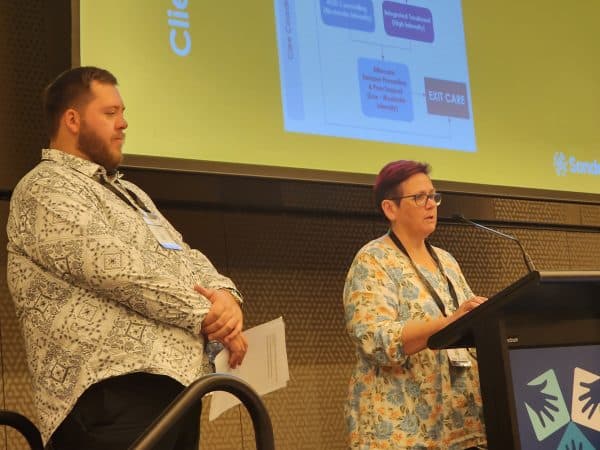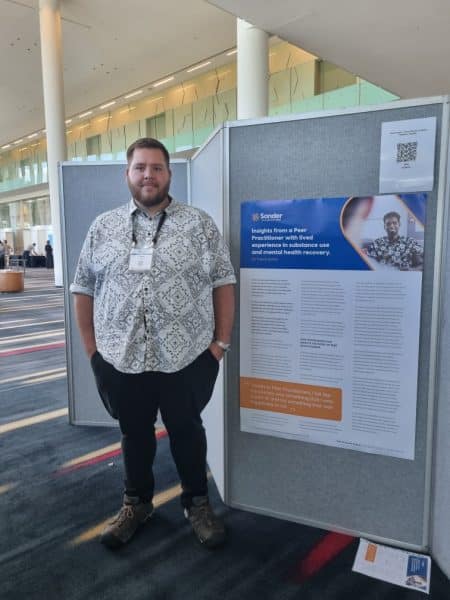Collaborating for change at the Australia & New Zealand Addiction Conference
Karyn Hodson, Country Mental Health & AOD Clinical Lead and Trevor Burch, Peer Practitioner at Sonder were delighted to attend the Australia and New Zealand Addiction Conference last month in Queensland, hosted by The Australian & New Zealand Mental Health Association.
The three-day event centred around the theme of ‘Connecting, Collaborating and Creating Better Communities’ and featured a variety of engaging and inspiring presentations, workshops and panels that explored topics such as:
- Progressive change – embracing and cultivating new ways of prevention, treatment, and recovery.
- Addicted to tech – understanding the connection: technology, addiction, and mental health.
- Collaborating for change – how can addiction services better work together to provide integrated, holistic, and evidence-based diagnosis, care, treatment, and support?
- Listening, sharing, and learning from Indigenous communities.
Karyn and Trevor particularly enjoyed a keynote address by Dr Gabor Mate titled ‘Trauma, Illness, and Healing in a Toxic Culture’ which explored the underlying causes of chronic physical illness, addiction, and mental health issues and challenged notions that they are mysterious aberrations, instead asserting that they are a direct consequence of our modern way of living.
“Both Trevor and I found Dr Mate’s address to be inspiring and set a progressive and thought-provoking tone for the conference. We intend to continue our learning by reading Dr Mate’s book, The Myth of Normal – Trauma, Illness and Healing in a Toxic Culture,” Karyn said.

At the conference, Karyn and Trevor presented Sonder’s innovative program, AIM, which is funded by Country SA PHN and supports people experiencing co-occurring addiction and mental health issues. With a team comprising of Peer Practitioners and Comorbidity Clinicians, the program helps clients set goals and develop strategies to reduce AOD use and manage mental health concerns.
During their presentation, Karyn and Trevor provided compelling evidence to emphasise the prevalence of comorbidity, revealing that a staggering three in four clients receiving AOD treatment services across Australia meet the criteria for at least one mental health disorder.
They provided an in-depth overview of the AIM program, including its client journey map and the integration of clinical work and peer support. They also discussed the challenges of establishing and facilitating an integrated service, as well as their plans for continuous improvement of the program.
The positive feedback received from the audience following the presentation reaffirmed that treating comorbidity is of great interest to many in the industry, and Sonder’s AIM program is a unique and much-needed approach.

Peer Practitioner, Trevor Burch also exhibited a poster presentation at the conference, reflecting on his own experience in substance use and mental health recovery and working as a Peer Practitioner in the industry. Trevor’s personal story offers a unique perspective and highlights the importance of lived experience in supporting those struggling with addiction and mental health issues. Click here to read Trevor’s reflection ‘Insights from a Peer Practitioner with lived experience in substance use and mental health recovery’.
Overall, Karyn and Trevor found the conference to be a valuable learning experience, offering insights into new ways of preventing and treating addiction, as well as better ways to collaborate to provide integrated mental health and addiction care.
For more information about Sonder’s integrated alcohol and/or other drugs and mental health program, AIM, visit sonder.net.au/AIM or call our friendly team on (08) 8209 0710.
AIM is supported by funding from Country SA PHN through the Australian Government’s PHN Program.